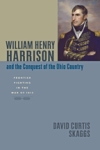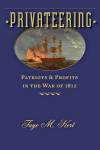Guest post by Donald R. Hickey
 With the completion of a small conference on the legacy of the War of 1812 in Rostrevor, Northern Ireland, over the July 4th weekend, the commemoration of the Bicentennial of our “forgotten conflict” appears to be over. For those of us with a fascination with the contest, it has been quite a run. Although interest in the Bicentennial was limited mostly to sites in Ontario, Canada, and east of the Missouri River in the United States, there was plenty from 2012 to 2015 to keep students of the war busy. Although the significant battles took place mainly in the borderlands along the Canadian-American frontier, the Chesapeake Bay played a significant role in the war. It was only one of ten major theaters of operation, but it was the scene of the most British raids. These included the low point in the war for the United States—the British occupation of Washington, D.C. in August 1814 and the burning of the public buildings there—and a high point three weeks later—the successful defense of Baltimore, which produced “The Star-Spangled Banner.”
With the completion of a small conference on the legacy of the War of 1812 in Rostrevor, Northern Ireland, over the July 4th weekend, the commemoration of the Bicentennial of our “forgotten conflict” appears to be over. For those of us with a fascination with the contest, it has been quite a run. Although interest in the Bicentennial was limited mostly to sites in Ontario, Canada, and east of the Missouri River in the United States, there was plenty from 2012 to 2015 to keep students of the war busy. Although the significant battles took place mainly in the borderlands along the Canadian-American frontier, the Chesapeake Bay played a significant role in the war. It was only one of ten major theaters of operation, but it was the scene of the most British raids. These included the low point in the war for the United States—the British occupation of Washington, D.C. in August 1814 and the burning of the public buildings there—and a high point three weeks later—the successful defense of Baltimore, which produced “The Star-Spangled Banner.”
Maryland did more than any other state to promote the Bicentennial. Maryland officials realized that this was their opportunity to publicize the central role that the Chesapeake had played in the war and in forging the national memory of the contest. Both the Maryland Historical Society and Fort McHenry did their part to see that Baltimore was included in the commemoration. As memorable as any event connected to the Bicentennial was the 2012 June weekend in 2012 when the tall ships docked in Baltimore. It was a rare treat for students of the war because it seemed that the conflict was the talk of the town. Annapolis followed up a year later with one of the most memorable conferences on the war. “From Enemies to Allies: An International Conference on the War of 1812 and Its Aftermath” generated attention not only in the United States and Canada but also in Great Britain.
The Bicentennial produced a flood of books on the war. Most dealt with the conflict’s military and naval history, but there were also some works on other aspects of the conflict. Once again the Chesapeake played a significant role. Especially noteworthy were the books published in the series Johns Hopkins Books on the War of 1812. There are now seven books in this series. These include several titles by Ralph Eshelman illuminating the war in the Chesapeake, Dave Curtis Skaggs’ fine study of William Henry Harrison’s western campaigns, Faye Kert’s pioneering book on privateering, Don Shomette’s seminal study of Commodore Joshua Barney’s flotilla in the Chesapeake, Carl Benn’s meticulously edited collection of native memoirs, and an illustrated history of the war that Connie D. Clark and I co-wrote. The Press also has published a short book that I wrote on Andrew Jackson and the Battle of New Orleans.
Will the flood of books and related activities during the Bicentennial mean that we no longer have to characterize the War of 1812 as a “forgotten conflict”? This is unlikely. After all, the war hardly compares in grandeur and importance with the Revolution and Civil War, those two great contests that are bookends for the period in U.S. history from 1775 to 1865. And there are many other reasons why the War of 1812 has slipped so deep into the recesses of the public memory. Its causes—maritime rights on the high seas in the Age of Sail—don’t resonate with Americans today. In addition, the war was waged inconclusively in far-flung theaters that stretched from Mackinac Island in northern Michigan to New Orleans on the Gulf Coast. Furthermore, it is not really clear who won the war (although everyone can agree that the biggest losers were the Indians, who were defeated both in Tecumseh’s War in the Old Northwest and the Creek War in the Old Southwest). Finally, the battle casualties cannot begin to compare with the losses in either the Revolution or the Civil War.
Flotilla: The Patuxent Naval Campaign in the War of 1812, by Donald G. Shomette
William Henry Harrison and the Conquest of the Ohio Country: Frontier Fighting in the War of 1812, by David Curtis Skaggs
Native Memoirs from the War of 1812: Black Hawk and William Apess, by Carl Benn
Privateering: Patriots and Profits in the War of 1812, by Faye M. Kert
What usually goes unappreciated in most treatments of the War of 1812 is its extraordinary legacy. If we measure wars by their consequences, then it’s hard to ignore the War of 1812. In the United States, the conflict boosted American self-confidence and nationalism, opened the door to territorial expansion, generated the birth of the American military establishment, and shaped the political landscape until the Civil War. Seven of the eleven presidents between James Madison and Abraham Lincoln either launched or boosted their public careers during the War of 1812, and anyone who had served in the field during the conflict had a significant advantage in any quest for elected public office.
The war also forged a national identity. The sayings and symbols that either originated in, or gained wide currency during, the war helped Americans understand who they were as a people and where their nation might be headed. Most of these sayings and symbols still resonate with us today. Among them are “Don’t give up the ship” (Captain James Lawrence’s words as he lay dying after the defeat of the USS Chesapeake by HMS Shannon); “We have met the enemy and he is ours” (Commodore Oliver H. Perry’s laconic report after defeating the British squadron on Lake Erie); “Old Ironsides” (which enjoyed four successful cruises during the war and even today is probably the best known U.S. warship); the Fort McHenry flag (long on display as the Smithsonian in Washington); “The Star-Spangled Banner” (which Congress named the national anthem in 1931); Uncle Sam (which became a common nickname for the U.S. government); the Kentucky rifle (which won an inflated reputation as game-changer and war-winner); Andrew Jackson (whose success in the field made him a symbol for the entire postwar era); and the Battle of New Orleans (which forged the myth of American victory in the war).
The war had no less an impact on Canada, for it was essentially that nation’s war of independence, and thus looms large in Canada’s public memory. Even Great Britain could not escape the war’s legacy. Although the British people quickly forgot about the conflict, the British government could not afford this luxury because it was responsible for defending Canada, and no one at the time thought this would be the last Anglo-American war. It did not take British leaders long to realize that the best way to protect Canada was to accommodate the United States, and this strategy ultimately paid off. Despite an often rocky road that included more than a couple war scares, by the end of the nineteenth century a genuine accord had blossomed between the two English-speaking nations. This turned into co-belligerency in World War I and a full-scale alliance in World War II that persists to this day.
The War of 1812 may have been a small and inconclusive war, but it left an outsized legacy that continues to shape the transatlantic world today. This is certainly reason enough to accord the war a bigger place in our public memory and in our history books. By all rights, the forgotten conflict should be forgotten no more.
 Donald R. Hickey, whom the New Yorker described as “the dean of 1812 scholarship,” teaches history at Wayne State College in Nebraska. He has written seven books on the conflict, including Glorious Victory: Andrew Jackson and the Battle of New Orleans, The Rockets’ Red Glare: An Illustrated History of the War of 1812, and The War of 1812: A Forgotten Conflict. He served as series editor for JHUP’s Johns Hopkins Books on the War of 1812.
Donald R. Hickey, whom the New Yorker described as “the dean of 1812 scholarship,” teaches history at Wayne State College in Nebraska. He has written seven books on the conflict, including Glorious Victory: Andrew Jackson and the Battle of New Orleans, The Rockets’ Red Glare: An Illustrated History of the War of 1812, and The War of 1812: A Forgotten Conflict. He served as series editor for JHUP’s Johns Hopkins Books on the War of 1812.







